Abstract
Background: With the rapid development of artificial intelligence, the traditional cloud computing model has serious bandwidth and energy consumption problems when storing and processing massive amounts of raw data. To address this problem, recent patents have investigated methods for intelligent task offloading and allocation in mobile edge computing.
Objective: A Directed Acyclic Graph (DAG) task unloading model is established to reduce the problem of task delay and energy consumption in edge networks. At the same time, Modified Tuna Swarm Optimization (MTSO) is used to improve execution efficiency.
Methods: Firstly, this paper integrates (i) inter-task dependencies; (ii) heterogeneity of computing resources in the edge network; and (iii) interference of wireless channels in the edge network. A DAG task offloading model is developed to reduce latency and energy consumption. The end users are guided to offload their tasks/sub-tasks to the most appropriate servers in the edge network, thus minimizing the end-to-end latency of all tasks in the edge network. Secondly, the MTSO algorithm is used to coordinate the dependencies and priorities of subtasks to improve execution efficiency.
Results: The experimental results show that when the number of users including subtasks is 10, the final edge server utilization rate is as high as 92%. A more fine-grained segmentation scheme can reduce the average delay of tasks and improve the utilization rate of edge servers.
Conclusion: The approach proposed in this paper reduces the end-to-end latency and improves resource utilization in complex applications under the premise of ensuring task dependency. It will relieve the pressure on the cloud and has certain engineering application value.
[http://dx.doi.org/10.2174/2666255813666191216122801]
[http://dx.doi.org/10.2174/2213275912666190716114033]
[http://dx.doi.org/10.1109/COMST.2017.2682318]
[http://dx.doi.org/10.1016/j.jpdc.2018.06.008]
[http://dx.doi.org/10.1016/j.sysarc.2021.102225]
[http://dx.doi.org/10.3390/electronics10233038]
[http://dx.doi.org/10.1109/TCC.2018.2789446]
[http://dx.doi.org/10.1109/JSAC.2017.2760160]
[http://dx.doi.org/10.1109/TWC.2019.2943563]
[http://dx.doi.org/10.1109/TSC.2018.2876535]
[http://dx.doi.org/10.1109/JIOT.2018.2868616]
[http://dx.doi.org/10.1109/JIOT.2020.2972041]
[http://dx.doi.org/10.1109/TPDS.2021.3076687]
[http://dx.doi.org/10.1109/JIOT.2022.3150976]
[http://dx.doi.org/10.1109/ACCESS.2019.2951746]
[http://dx.doi.org/10.1109/TNET.2016.2614129]
[http://dx.doi.org/10.1155/2021/9210050] [PMID: 34721567]
[http://dx.doi.org/10.1109/JIOT.2016.2579198]
























